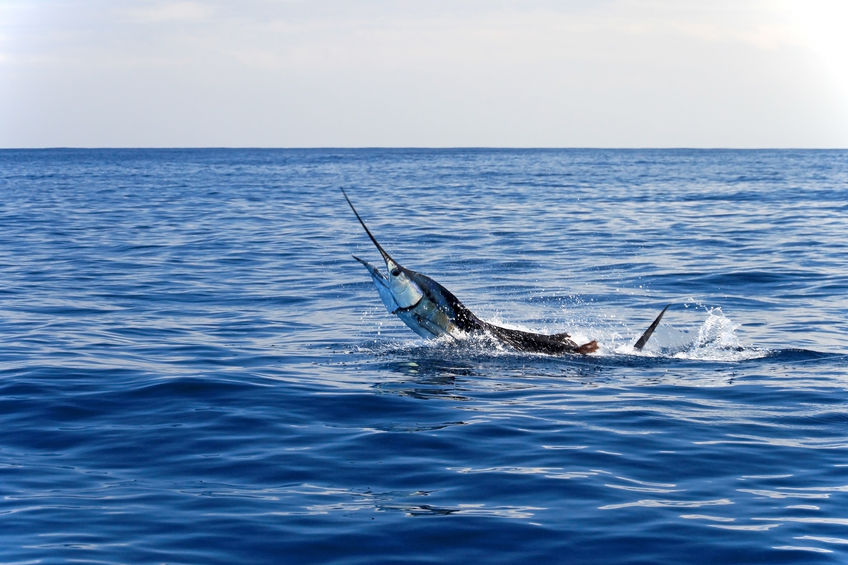Officials in California and Washington, D.C. are on the verge of inflicting a double whammy on the Golden State’s struggling swordfish fishermen. What is being done in the name of protecting marine mammals and sea turtles from the practices of California fishermen will ironically – and predictably – benefit foreign suppliers of swordfish, many of whom operate with nary a thought of protecting endangered marine life.
In September 2018, then-Governor Jerry Brown (D) signed a bill (S.B. 1917) banning the most widely used method of catching swordfish for commercial use by 2022. That method, known as drift gillnetting, is one of only two legal ways commercial fishermen can catch swordfish in California. The other legal method, harpooning, is expensive and inefficient, leaving drift gillnetting as the gear of choice for the vast majority of swordfish fishermen.
Under the new law, however, drift gillnetting will be illegal within three nautical miles of the California coast. To ensure compliance, S.B. 1017 also terminated California’s decades-old permitting system for the commercial catch and landing of swordfish by drift gillnetting.
As if that weren’t enough, the National Marine Fisheries Service (NMFS), a division of the U.S. Department of Commerce also decided to get into the act. NMFS plans to issue a rule mandating an immediate closure of the California/Oregon drift gillnet fishery for swordfish and thresher shark (14 -inch minimum mesh size) if a hard cap (i.e., limit) on mortality/injury is met or exceeded for certain protected species during a rolling two-year period. The length of the closure will depend on when the hard cap is reached.
Family-Owned Businesses
California’s swordfish fishermen live a world apart from Silicon Valley high flyers or San Francisco hedge-fund managers. They are small, family-owned businesses, the kinds of enterprises that once drew people to the Golden State and are now disappearing at an alarming rate due to California’s hostile regulatory and tax policies. The laws targeting California fishermen supposedly protect marine mammals and sea turtles from being accidentally caught in nets. However, with plenty of longstanding protections in place such as seasonable closures and equipment and observer mandates for boats, unwanted bycatch is minimal.
But the squeeze play launched by Sacramento and Washington will destroy California’s commercial swordfish fishermen, shifting demand to foreign markets where environmental accountability and oversight are far less stringent. The unintended result will be more animals killed or injured. If the policies are allowed to stand, they will spell the end to California’s generations-old swordfish businesses and destroy the livelihoods of the families involved in them.
The fishermen are not taking this lying down. With the assistance of the Pacific Legal Foundation (PLF), they have filed two lawsuits, one is state court – Abad, et al. v. Director, Cal. Dept. of Fish & Wildlife, et al. – and one in federal court – Williams, et al. v. Ross, et al.
Unlawfully Depriving Fishermen of Their Rights
In the state case, attorney Damien Schiff pointed out in PLF’s complaint that the West Coast swordfish industry is an important component of the nation’s seafood industry, as evidenced by the NMFS’s decision to federalize the fishery in 2018 through a permitting system administered by that agency. But once S.B. 1017 is fully implemented, it will eliminate all outstanding state permits, thereby depriving swordfish fishermen their right to earn a living.
“Because it attacks what federal law expressly permits, and because it precludes the commercially viable use of a federally regulated fishery, California’s anti-fisherman campaign unlawfully deprives Mr. Abad and Mr. Brown (two of the plaintiffs) of their federal rights, including their Fourteenth Amendment right to earn a living secured by the Privileges and Immunities Clause, or is otherwise preempted by federal law.”
Plaintiffs in the federal case argue that the new NMFS rule fails to minimize the economic impact of the policy on fishermen and their communities, as required by federal Magnuson-Stevens Fishery Conservation and Management Act, commonly known as the Fishery Act.
Furthermore, as noted by Schiff and fellow PLF attorney Michael Poon, NMFS’s hard caps rule violates the Constitution’s Appointment Clause, which reserves the exercise of significant federal power, including rule-making, to “Officers of the United States” (Buckley v. Valeo). Such officers must be appointed by the President with the advice and consent of the Senate. But the federal hard caps rule was proposed by the Pacific Fisheries Management Council, none of whose members were appointed by the President with the advice and consent of the Senate.
Both complaints were filed in March 2020 so it will take some time for them to wind their way through the court system. In the meantime, the fate of the small swordfish businesses hangs in the balance.
